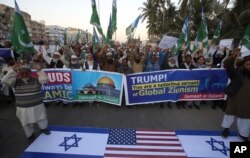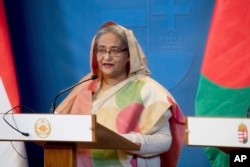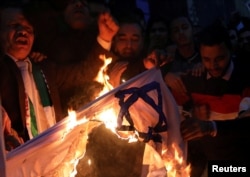Islamist parties are using the U.S. decision to recognize Jerusalem as Israel’s capital as a rallying cry that likely will resound in upcoming election campaigns in Muslim-dominated countries.
U.S. President Donald Trump’s announcement on Wednesday sparked protests in a number of countries, with clashes breaking out with security forces in Palestinian territories. More crowds are expected from Indonesia to Turkey after Friday prayers.
It’s unclear how deep and lasting the outbreak of anti-American sentiment will be, and whether it may include terror attacks or other violence as some world leaders predicted. Trump’s earlier actions this year, including a ban on visas from several Muslim-majority countries, have fueled suspicions that America is becoming increasingly hostile to Muslims.
One key country to watch is Pakistan, which has seen growing religious conservatism and has bristled at U.S. pressure to oust extremist groups that have been blamed for attacks in neighboring Afghanistan.
Islamabad, which doesn’t recognize the existence of Israel as a state, has denied providing terror groups with safe havens.
Islamist leader Hafiz Saeed, who has been accused of masterminding terrorist attacks in India, was released from house arrest last week. He quickly announced that his Jamaat-ud-Dawa group, which has been designated a terrorist group by the United States, plans to run in national elections in May and could benefit from further fomenting anti-U.S. sentiment.
The country’s major religious party Jamaat-e-Islami has called for nationwide protests Friday and urged Muslim leaders to sort out a joint strategy against Trump’s policy on Jerusalem.
Some U.S. allies have also denounced Trump’s change in longstanding U.S. policy, although dependence on U.S. aid is unlikely to prevent them from completely severing ties.
A spokesman for Afghanistan’s presidential palace said the action “jeopardizes the peace process in the Middle East” and that “any unilateral action in this regard without Palestine’s participation and the solution of an independent state will not result in a positive outcome and a permanent solution.”
Bangladesh Prime Minister Sheikh Hasina agreed.
“There’s a U.N. resolution on this and no one will accept the announcement disregarding it,” she told a news conference, although Trump has repeatedly shrugged off criticism of his policies.
The reaction to the decision is liable to be tempered by the fact that many Muslim countries are preoccupied with other issues.
Saudi Arabia is engaged in an increasingly bitter regional rivalry with Iran, even as its youthful crown prince seeks to push through major political and social reforms. That rivalry has contributed to a devastating civil war in Yemen, a struggle for power and control in areas vacated by the battlefield defeat of the islamic State extremist group and a trade embargo against Qatar, which several of its neighbors have accused of supporting terrorism.
Terrorist reaction
Even in defeat, Islamic State remains a menace in the region, with some of its fighters believed to have gone into hiding in Afghanistan and elsewhere.
While official reaction to Trump's announcement was tempered, terrorist organizations did not mince words when declaring their opposition to the declaration. SITE Intelligence Group, an American company that tracks online activity jihadist organizations, reported several threats from terrorist groups around the world.
The Kashmir-based jihadi group Ansar Ghazwat-ul-Hind called on Muslims all over the world to attack U.S. and Israeli embassies, and harm corporate and financial interests of both countries. A statement released by the group said it is a "duty" for Muslims to urgently act and "do everything that is needed to stop the madman sitting in White House and stop him from dishonoring the sacred land of Bait al-Maqdis," referring to Jerusalem by its Arabic name.
In Gaza, an Islamist militant group called the Al-Tawheed Brigades took responsibility for rockets fired at Israel on Thursday in what it declared was its "first response" to the U.S. recognition of Jerusalem as Israel's capital.
The pro-Islamic State media group Tarjuman al-Asawirti declared that "terrorism is the solution" and called for increased terrorist attacks on the West. The U.S. "only understands the language of bullets, car bombs, IEDs, and slitting of the throats," it said.
Regional branches of al-Qaida also condemned the United States. Al-Qaida in the Islamic Maghreb (AQIM) expressed solidarity with Muslims on the issue and urged all fighters to make the liberation of Palestine their "central cause."
Al-Qaida Central (AQC) called on Muslims to strike the "vital" interests of America and its allies. It called Trump's declaration a "blatant aggression" and called on its allies to retaliate: "Crusader allies everywhere. This is a simple equation; just as you kill us, you shall be killed; just as you bomb us, you, too, shall be bombed, and the one who initiates hostilities shoulders the blame."
VOA's Dari, Urdu, Deewa, Turkish and Indonesian services contributed to this report







